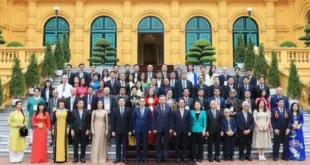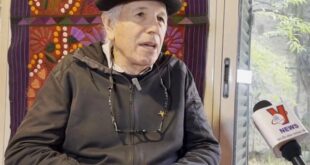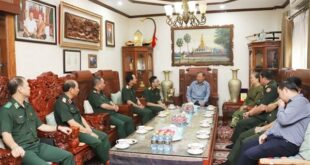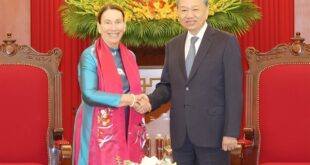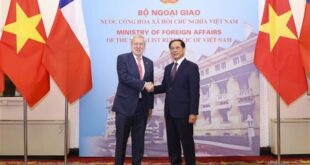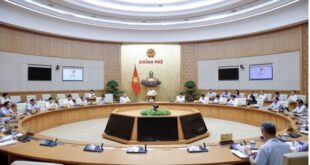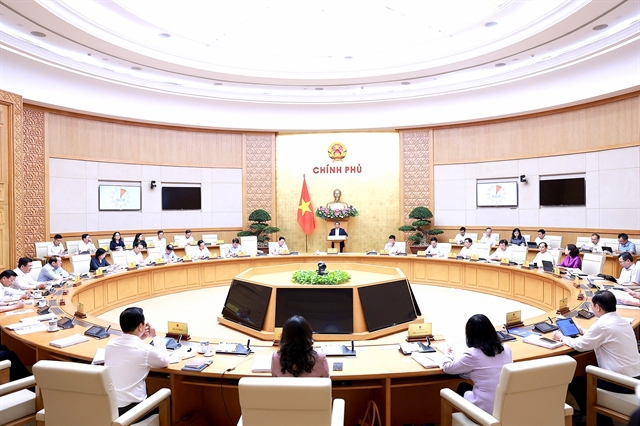 |
| Participants at the Government’s regular meeting on Monday morning in Hà Nội.— VNA/VNS Photo Dương Giang |
HÀ NỘI — The Government has managed to save around VNĐ700 trillion (US$27.8 billion) for increasing basic salaries while maintaining control over inflation, which has seen only a slight rise.
Prime Minister Phạm Minh Chính made the assessment as he chaired the Government’s regular meeting on Monday morning in Hà Nội.
The meeting was convened to discuss and assess the socio-economic situation for July and the first seven months of this year, the allocation and disbursement of public investment capital, the implementation of the three national target programmes and the interest rates on the VNĐ120 trillion ($4.76 billion) credit package for preferential loans for social housing and workers’ accommodation.
At the beginning of the session, the Government observed a minute’s silence in memory of late Party General Secretary Nguyễn Phú Trọng.
During the meeting, Chính said that the global situation remained complex and unpredictable in July, marked by political fluctuations, intense competition among major nations, escalating conflicts in Ukraine, the Red Sea and Gaza Strip, as well as slow and unstable global economic recovery, with high US dollar and gold prices.
Raw material and transport service prices experienced significant volatility, inflation remained above targets in many countries.
The United States’ Federal Reserve had not reduced interest rates, and other issues such as an ageing population, resource depletion, extreme weather and disease continued to have severe impacts.
Notably, July saw some of the hottest days on record.
Chính also added that domestically, the situation presented both opportunities and challenges, however the latter outweighed the former, particularly as Việt Nam was a developing country with a transitioning economy, modest scale, high openness and limited resilience.
Thanks to the concerted efforts of the Party, the army and the people, the socio-economic situation in July continued its positive trend, achieving better results than June and performing better over the first seven months compared to the same period last year.
Growth was driven across all three sectors of industry, agriculture and services.
The macro economy remained stable, inflation was controlled and major balances were maintained with surpluses, he said.
“Sixty out of 63 provinces and cities reported an increase in industrial production, marking a notable highlight. Many existing issues were addressed,” he noted.
Social welfare was assured and the people’s living standards improved.
Cultural, sports, health, education and training sectors received attention and saw many positive outcomes.
Efforts to build a transparent, action-oriented Government was made, serving the people and enhancing administrative reforms and anti-corruption measures, contributing to strengthening public trust in the Party and State.
National sovereignty was upheld, political security and social order were ensured, foreign relations and integration were promoted and the country’s reputation and status continued to rise.
According to the Ministry of Planning and Investment, the socio-economic situation in July and the first seven months of this year achieved many important results.
The Consumer Price Index (CPI) for the first seven months remained within the National Assembly’s target range.
The monetary market was fundamentally stable, currency exchange rates and credit were managed proactively and flexibly, ensuring the safety of financial institutions.
State budget revenue for the first seven months was estimated at 69.8 per cent of the plan, up by 14.6 per cent year-on-year.
Public debt, Government debt, national foreign debt and budget deficits were effectively controlled.
Exports and imports continued to rise with a 17.1 per cent increase over the first seven months and a trade surplus $14.08 billion was estimated.
Registered Foreign Direct Investment (FDI) for the first seven months reached over $18 billion, up by 10.9 per cent compared to the same period last year.
Industrial production was recovering quickly, with an 11.2 per cent increase in the industrial production index in July compared to the same period last year, and an 8.5 per cent increase over the first seven months.
The agricultural sector continues to play a crucial role in the economy and ensures food security.
The service sector maintained strong growth, with nearly ten million international visitors in the first seven months, a 51 per cent increase year-on-year.
In July, 14,735 new businesses were registered and 8,201 businesses resumed operations. Over the first seven months, 139,500 businesses were newly established or resumed operations, exceeding the number that exited the market.
Many international organisations have positively assessed Việt Nam’s economic performance and prospects for this year.
Ongoing challenges
The Government leader said that despite the positive results, there were still shortcomings and challenges, including high pressures in managing economic stability, controlling inflation and exchange rates.
Some sectors faced significant production and business difficulties, with a high number of businesses exiting the market, security and order issues presented risks, discipline and regulations were not always strict, with some officials avoiding responsibility.
Therefore, he urged attendees to carefully evaluate the implementation of tasks in July and the first seven months, identifying completed tasks and areas requiring more decisive action to resolve issues by August and beyond.
Discussions should clearly identify strengths, weaknesses, causes and lessons learned at the meeting, share innovative and breakthrough practices, forecast the situation for August to achieve growth targets and ensure effective implementation of newly enacted laws, especially those related to land, housing and real estate.
There should be a focus on promoting traditional and new growth drivers, finalising programmes and proposals for the Party Central Committee, preparing for the 10th Party Central Committee Meeting of the 13th Congress and the 8th National Assembly session, with clear responsibilities, deadlines and results and enhancing inspection, supervision, timely rewards and disciplinary actions.
Significant national events
Chính highlighted that in July, the nation and international friends deeply mourned the passing of Party General Secretary Nguyễn Phú Trọng.
He said that millions of people bid farewell to the late Party General Secretary, hundreds of countries sent condolences and over 1,000 international delegations visited Vietnamese embassies abroad to pay their respects.
“This not only reflects admiration and respect for late Party General Secretary Nguyễn Phú Trọng but also highlights the country’s elevated status and international reputation,” he said.
He also noted that on Sunday, the Party Central Committee unanimously elected President Tô Lâm as General Secretary of the Communist Party of Việt Nam (CPV)’s 13th Central Committee.—VNS
- Reduce Hair Loss with PURA D’OR Gold Label Shampoo
- Castor Oil Has Made a “Huge” Difference With Hair and Brow Growth
- Excessive hair loss in men: Signs of illness that cannot be subjective
- Dịch Vụ SEO Website ở Los Angeles, CA: đưa trang web doanh nghiệp bạn lên top Google
- Nails Salon Sierra Madre
 VnExpress News The News Gateway of Vietnam
VnExpress News The News Gateway of Vietnam
